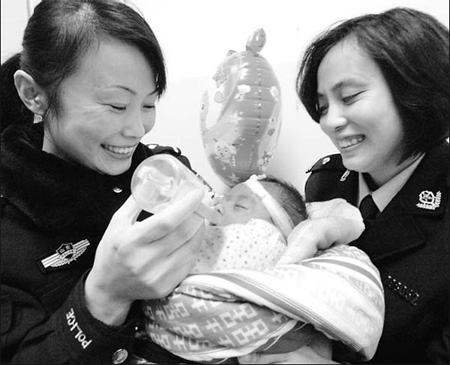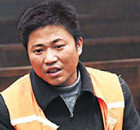Foreign and Military Affairs
China joins UN fight against human trafficking
By Chen Jia (China Daily)
Updated: 2009-12-23 08:10
 |
Large Medium Small |
Authorities yesterday announced plans to join a United Nations (UN) supplementary protocol to fight an increasing number of cross-border human trafficking cases.
 Police of Shanye county in Shandong province feed an infant who was rescued from kidnappers earlier this month. Efforts are being made to reduce cross-border human trafficking. [China Daily] |
"We've been faced with more organized and more professional cross-border human trafficking crimes in recent years. So it is necessary to strengthen international cooperation to fight the crime," Vice-Foreign Minister Li Jinzhang said.
| ||||
The top legislature is expected to announce its final decision on Saturday.
The UN protocol could help China effectively implement its Anti-trafficking Action Plan (2008-2012) for women and children, which took effect in 2007, Li said.
The protocol would be implemented on the Chinese mainland and the Macao Special Administrative Region, but not in Hong Kong, he said.
Yin Yin Nwe, the United Nations Children's Fund (UNICEF) representative to China, said that joining the protocol would benefit both China and the international community.
"Harmonizing China's definition with the international definition will strengthen the country's role and efforts to prevent and reduce trafficking," she told China Daily.
"This is because harmonized standards and definitions mean much easier cooperation between countries where cross-border trafficking is a concern ... Another positive outcome for both China and the international community will be that trafficking victims will receive better repatriation and rehabilitation services."
UNICEF has also offered support to the Ministry of Public Security to establish six Border Liaison Offices along China's borders with Laos, Myanmar and Vietnam to facilitate county-to-country investigation and cooperation on human trafficking.
Between 2000 and 2007, the ministry detected more than 44,507 cases of trafficking of women and children, with nearly 133,000 victims rescued, UNICEF statistics show.
Between April and October 2009, more than 6,000 women and children were rescued in a national campaign to combat human trafficking, UNICEF said.
"This may be the tip of the iceberg as many cases continue to go undetected," Yin said.











